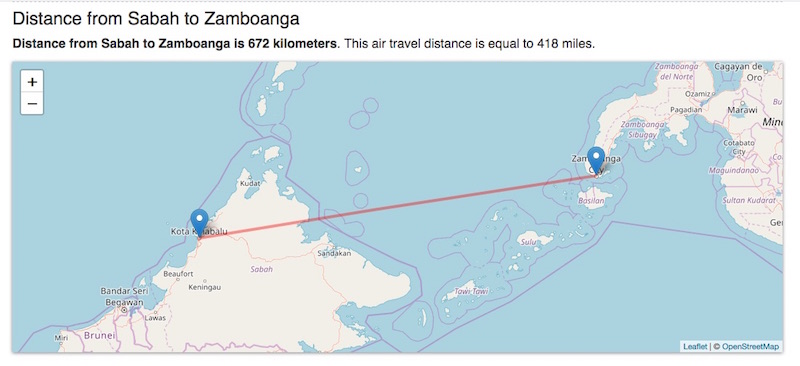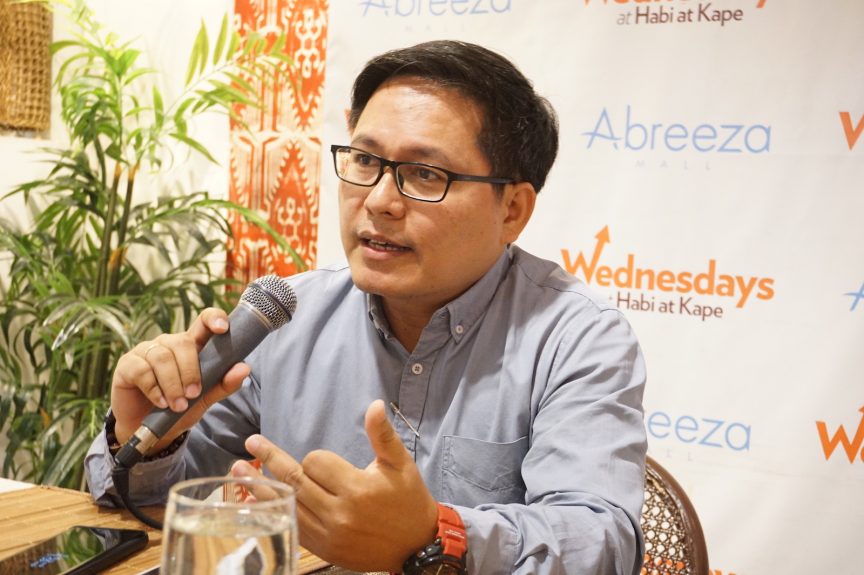DAVAO CITY (MindaNews / 26 October) — The centuries-old practice of cross border trading between Tawi-Tawi and Sabah, Malaysia will resume January 2019 following the pronouncement of Sabah Chief Minister Datuk Seri Shafie Apdal that it would open its border for barter trading after banning it in 2016, Romeo Montenero, Executive Director of the Mindanao Development Authority (MinDA) said.
Montenegro told reporters during the media forum Wednesday at Habi at Kape that they are waiting for the issuance of an executive order from Malacañan Palace, drafted by Department of Trade and Industry, that would set the specific guidelines for barter trading.
“If there are some restrictions to certain items,” he said, “we’re looking at better flowing of commodities via barter trade with that announcement.”
 © OpenStreetMap contributors
© OpenStreetMap contributors
He added the East Kalimantan province of Indonesia will also explore the possibility of joining the barter trade.
“East Kalimantan is also looking at being actively engaged in the barter trading so the barter trading later on is not just limited to Tawi-Tawi and Sandakan (Sabah),” he added.
He said small informal traders will benefit from this because “they don’t have to fear being apprehended, pursued, or abused because they are mainstreamed into the economic arrangement.”
He added the resumption of the barter trade will allow traders in Tawi-Tawi to tap into cheaper commodities from Sandakan, Sabah because if “they are forced to source out commodities from mainland Zamboanga, it’s three times more expensive.”
 MinDA Executive Director Romeo Montenegro speaks during “Wednesdays at Habi at Kape” in Davao City on Oct. 24, 2018. MindaNews photo by ANTONIO L. COLINA IV
MinDA Executive Director Romeo Montenegro speaks during “Wednesdays at Habi at Kape” in Davao City on Oct. 24, 2018. MindaNews photo by ANTONIO L. COLINA IV
Transport ministers of the 10-country Association of Southeast Asia Nations (ASEAN) will sign next month a memorandum of understanding (MOU) allowing non-conventional size ships, including wooden boats, to cross the maritime borders of the countries within the region, he said.
Montenegro said that all 5-tonnage boats and less, even wooden vessels, can continue plying the seas within the ASEAN area once the MOU is signed.
ASEAN comprises Brunei Darrusalam, Cambodia, Indonesia, Lao, Malaysia, Myanmar, Philippines, Singapore, Thailand, and Vietnam.
He said this was originally proposed at the level of the transport ministers of the Brunei Darrusalam-Indonesia-Malaysia-Philippines East ASEAN Growth Area (BIMP-EAGA) years ago but the proposal was later adopted by the ASEAN ministers.
“What originally started as a BIMP-EAGA initiative many, many years ago is now going to be adopted in ASEAN so what this means is that once that particular agreement is signed by transport ministers, the NCSS or the less than 5-tonnage vessels, the wooden vessels, are now recognized as a standard therefore they can continue to ply, cross broader,” he said.
He said the International Maritime Organization in January this year mandated the transition of all non-steel hull vessels to steel vessels, more particularly to vessels traversing major seas.
But he said officials from the BIMP-EAGA argued maritime boundaries in sub-region are within short distances and can be traversed via smaller vessels, even wooden boats of the fishermen.
He added fisherfolk and small traders engaged in cross border trading would benefit from this development.
“It’s still logical as medium of transport especially for our barter traders in Tawi-Tawi going towards Sabah because of the economy of scale, you cannot expect them to shift to steel vessels. They cannot afford that,” Montenegro said. (Antonio L. Colina IV / MindaNews)
